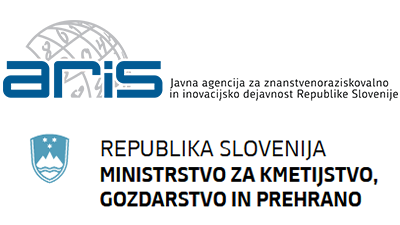Projects
The purpose of the investment project BTH-NIB is the assurance of the appropriate infrastructural conditions for the use of research and developmental opportunities in the fields of operation of the NIB.
Play Video About project Publication
Pollination deficit in Slovenian agriculture
Project coordinator: Assist. Prof. Danilo Bevk, PhD
Code: CRP V4-2411
Duration: 1. 9. 2024 - 31. 8. 2027
At least 84% of crops grown in Europe are partially dependent on insect pollination. Pollination affects not only the quantity but also the quality of the crop. Besides the honeybee, wild pollinators also play a crucial role and are often more efficient. Thus, maintaining a diversity of pollinators is key for reliable pollination, stable production, and biodiversity conservation. Among wild pollinators, wild bees—such as bumblebees and solitary bees—are the most important. Flies and butterflies also pollinate, as do some beetles and wasps to a lesser extent.
The number of honeybees in Europe is not declining; in some countries, including Slovenia, it is even increasing. However, the number and diversity of wild pollinators are decreasing. Pollinators face threats from a lack of food, pesticide use, climate change, a lack of suitable nesting sites, diseases, and invasive species. Since the honeybee cannot replace the role of wild pollinators, the decline in pollinator populations is already threatening agricultural production in some parts of the world.
The decline in wild bee populations is also observed in Slovenia. Whether this already affects the quality of pollination in agriculture has not been researched. There is also no strategy for managing pollinator populations to ensure reliable pollination in agriculture and biodiversity conservation. Strong pollinator populations should be one of the competitive advantages of Slovenian agriculture.
The main goals of the research project are: (1) to review the current state of pollination in Slovenia, (2) to investigate the state of pollinators in selected orchards and fields, (3) to measure any potential pollination deficit, (4) to propose measures based on the results to ensure sufficient pollination of agricultural crops, (5) to supplement the monitoring of wild pollinators in Slovenia, (6) to propose agricultural policy measures to ensure sufficient pollination of crops and improve biodiversity, and (7) to disseminate knowledge on pollinator protection in agriculture to various target groups, contributing to the competitiveness and sustainable development of Slovenian agriculture.
The project is organized into seven work packages (WP):
In WP1, we will review and analyse the pollination needs of Slovenian agriculture, existing data on pollinator status, and select target crops and areas for pollinator status research and pollination deficit measurement.
In WP2, we will investigate the state of pollinators in selected orchards and fields using three different pollinator sampling methods for a comprehensive picture. In WP3, we will measure the pollination deficit at the same locations.
Based on the results, in WP4 we will propose measures to maintain sufficient pollination of agricultural crops. In WP5, we will propose a monitoring system for pollinators and pollination in agriculture. The purpose of the monitoring is to continuously track the status of pollinators in the context of adequate pollination in agriculture.
In WP6, we will review agricultural policy measures and identify those that positively or negatively affect pollinators and pollination, and suggest possible improvements. We will also propose agricultural policy measures that would contribute to the competitiveness and sustainable development of Slovenian agriculture.
WP7 will focus on disseminating the project results to various target groups (farmers, beekeepers, agricultural advisors, policymakers, etc.). Among other activities, we plan to publish a brochure and a video on the importance of pollinators, signs of pollination deficit, and measures to ensure adequate pollination.
The project will help Slovenia, as the initiator of World Bee Day, become a model for the sustainable management of pollinator diversity for reliable food production and biodiversity conservation.


 Scope of NIB's accreditation is given in the Annex to the accreditation certificate and in the List of accredited methods for detection of GMOs and microorganisms – plant pathogens
Scope of NIB's accreditation is given in the Annex to the accreditation certificate and in the List of accredited methods for detection of GMOs and microorganisms – plant pathogens 
